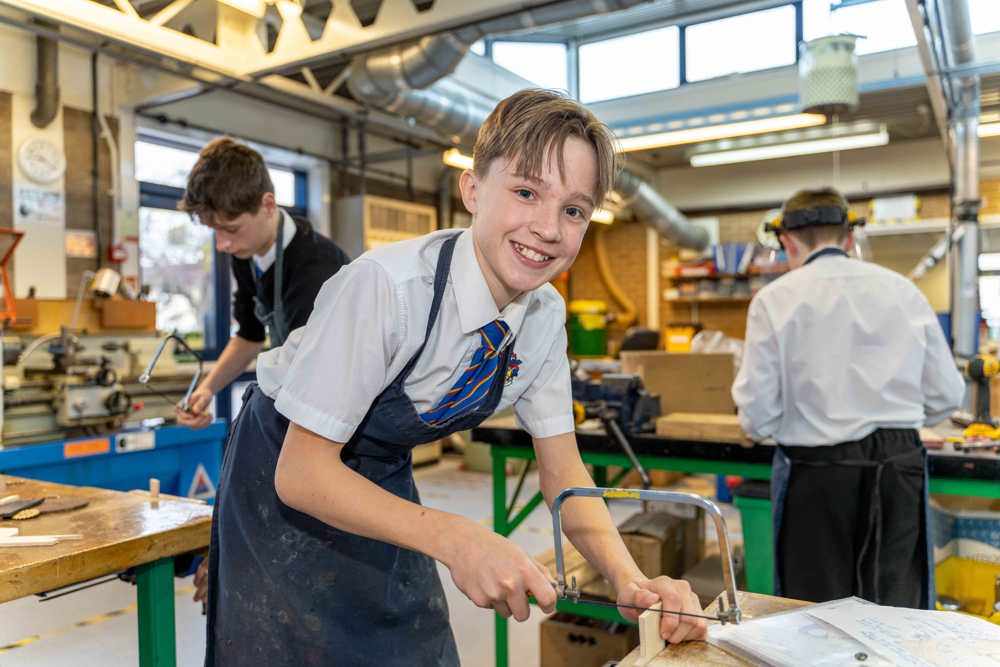
Design and Technology
Design and Technology students develop a broad range of subject knowledge, drawing on mathematics, science, art, computing and engineering to design and make products intended to solve a range of real-world problems. Expert DT teachers encourage learners to think creatively and independently, and pupils develop a critical understanding of the impact of DT on daily life.
Students have their lessons in our two workshops and a dedicated design room with ICT and CAD CAM equipment, and in our well-equipped Food Technology building. Those who choose to study DT at GCSE and A Level build on the knowledge and skills they have gained in Key Stage 3, choosing to specialise in one area.
Curriculum Map

Key Stage 3
Pupils in Years 7, 8 and 9 are taught DT for one period a week. Year 7 and 8 learners rotate subject areas every 18 weeks and cover the four discipline areas of Food Technology; Resistant Materials; Systems and Control (electronics, CAD/CAM skills and modelling); and Graphics and Product Design. In Year 9 students follow an 8/9 week rotation of the four areas. One piece of homework is set a week, and there are three assessed pieces of work every half term. These assessments include practical tasks, classroom-based tasks and homework.
Year 7 and 8
Food Technology: health and safety in the kitchen and cooking skills. Resistant Materials: timbers, metals and CAD/CAM. Systems and Control: alarm systems, circuit design and circuit building. Graphics: communication skills, papers and boards and packaging.
Year 9
Food Technology: the ‘eat well’ plate. Resistant Materials: the iterative design process, making a high-quality product. Systems and Control: programmable circuits, CAD/CAM. Product Design: real-life designers, the iterative design process.

Key Stage 4
Pupils follow the AQA GSCE Design and Technology course and are taught for five periods a fortnight. Two pieces of homework are set every week, one theory and one based on consolidating practical/design-based knowledge. The qualification comprises 50% coursework with a non-examined assessment undertaken throughout Year 11 in class; one folio of design work (digital portfolio); and an examination at the end of Year 11 which forms 50% of the marks.
Year 10
Focus on core materials: timbers, metals, plastics, paper and board, textiles and electronics. Specialise in woodwork, carrying out functional performance testing (FPT) using different timbers. Develop practical skills in metals, plastics and CAD/CAM.
Year 11
Non-examined assessment project: students design and make a full working prototype of a product.
Useful Links

Key Stage 5
A Grade 7 at GCSE Design and Technology is required to study this course. Pupils study the AQA A Level specification and are taught for eleven periods a fortnight. There is one piece of theory homework a week, plus one design or practical-based homework task. The A Level comprises 50% coursework (a non-examined assessment completed in Year 13) and 50% examination (two examinations of 25% each completed at the end of Year 13).
Entry requirement
Grade 7 GCSE Design Technology or equivalent, or if not studied a total of 21 points from Maths, English Language and a Science.
Year 12
Core design skills. Materials, applications and manufacturing: timbers, metals, plastics, paper and board, composite, smart, modern. Digital design and manufacture. Enhancement of materials. Modern, industrial and commercial practice. Requirements for product design and development. Health and safety. Protecting intellectual property. Sustainability in design. Marketing in the development of products. Design methods and the history of design.
Year 13
Non-examined assessment project: students complete an A3 folder/digital folio of design work and a final working prototype of their product.
Enrichment
Key Stage 3 students are encouraged to cook at home to extend their learning, and have the opportunity to take part in extracurricular cooking sessions before school. Learners take part in regular bake-off style competitions in lesson time, with prizes on offer and special guest judges tasting and marking their creations. Pupils also run a weekly pop-up café in the Food Technology building to raise money for local charities. Year 10 students compete against other schools in the one-day Rotary Technology Competition, and pupils in Year 11 have the opportunity to apply for the prestigious Arkwright Scholarship in Engineering or Design.
Head of Design and Technology
Chris Bream cdb@strs.org.uk